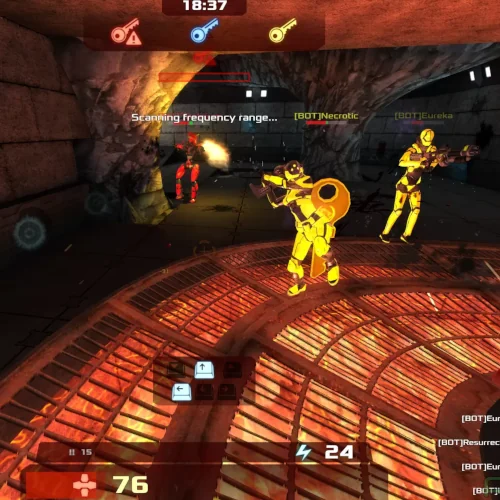A New Commercial Game For Linux That's Not An FPS

What's the game and who's behind the port? The game is CoreBreach, an "anti-gravity" racing game that's developed as a joint-venture by two Austrian game studios (CoreCode and nCreate). This racing game -- that also includes some "combat-based game-play" -- was originally written for Apple Mac OS X and the Austrian developers then decided to bring this game to Linux.
I was contacted this morning by Julian Mayer, a developer at CoreCode, about the forthcoming CoreBreach Linux port. Julian shares that the Linux game port is nearly complete and they expect it to go into beta this week. The game will initially be distributed via the Desura Linux client but may come to other distribution platforms at a later date. (For reference, the Mac OS X version costs $6.99 via the Mac App Store.)
The CoreBreach racing game includes six "anti-gravity racing ships", six racing tracks, six combat weapons, a career racing mode, split-screen multi-player, and other gaming features. What makes this game interesting and unique for Linux besides coming from the wonderful land of Puntigamer and Stiegl Paracelsus Zwickl? In a later email to Phoronix, Julian wrote about some of the interesting technical traits.
From the top of my head (and as far as i know):
CoreBreach is the first commercial game ever to use GNUstep. we actually worked closely with the GNUstep project, submitted nearly 50 bugreports and some patches as well. CoreBreach embeds a patched copy of gnustep-svn.
CoreBreach is the first significant project that is written in Objective-C 2.0 and runs on Linux. We are extensively using new 2.0 features like (synthesized) properties (even of C++ entities) and fast enumeration. To enable this we are using a pre-release version of clang/llvm 3.0 and the new Objective-C runtime libobjc2[1] (which is isn't even included in any Linux distribution yet).
CoreBreach is the first non-trivial application to use the C-language extension "Blocks"[2] on Linux. We are extensively using blocks for all animations. Again this is enabled clang/libobjc2.
CoreBreach has a custom 3D-engine written just for the game, its one of only very few 3D engines ever written in Objective-C and besides Oolite[3], the only one that runs on Linux.
Besides the technical details, CoreBreach should be the first "anti-gravity" racing game for Linux!
It's interesting to see their use of LLVM/Clang and they have submitted patches upstream to GNUstep -- the leading open-source implementation of Apple's Cocoa Objective-C libraries. CoreCode is traditionally a development house behind Mac OS X software. Hopefully this will show other Mac OS X studios that it isn't too difficult bringing their Apple titles to Linux.
More information on CoreBreach is available from the game's web-site. Julian also provided this screenshot of CoreBreach running natively on Linux. Look for its Linux beta release soon.
Other recent Linux gaming news include John Carmack personally working around a patent issue in the Doom 3 source-code, Icculus providing new thoughts on Linux gaming, Humble Voxatron not making a million dollars, and Unigine Engine advancements.
59 Comments

